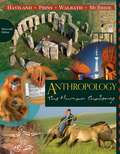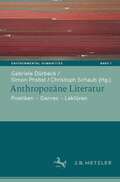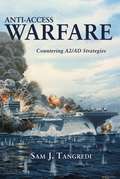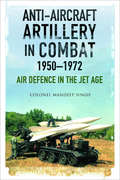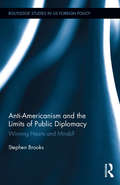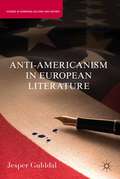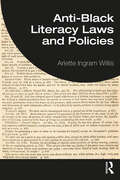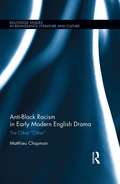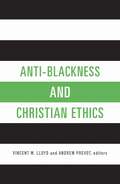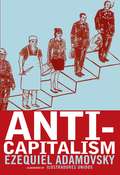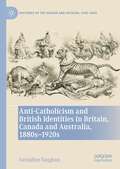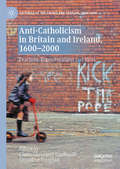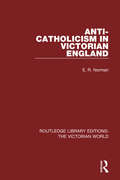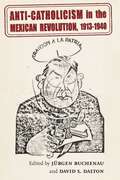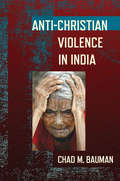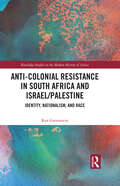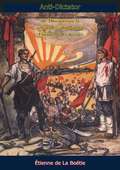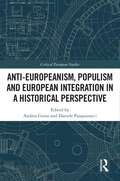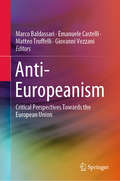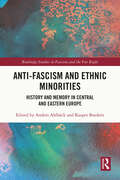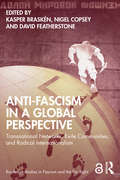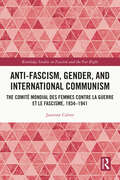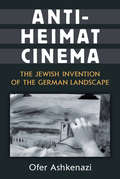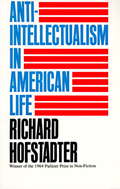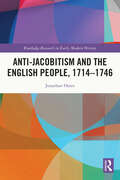- Table View
- List View
Anthropology: The Human Challenge
by William A. Haviland Harald E. L. Prins Bunny Mcbride Dana WalrathThis book offers a comprehensive and balanced presentation on views of human culture, evolution, and prehistory. The text presents the principles and processes of anthropology, both physical (biological) and cultural, including ethnology, linguistics, and prehistoric archaeology in an integrated, holistic manner. The book's framework emphasizing the challenge of human survival, the connections between biology and culture, and the impact of globalization on peoples and cultures around the world, serves to unify the material. The authors integrate contemporary research and ideas from several schools of thought, and use a lively writing style to engage readers and keep them interested in "real world" anthropology.
Anthropozäne Literatur: Poetiken – Themen – Lektüren (Environmental Humanities #1)
by Gabriele Dürbeck Simon Probst Christoph SchaubDer sich seit 2000 etablierende Anthropozän-Diskurs begreift die Menschheit als geophysikalische Kraft. Wesentliche Strukturmerkmale dieses Diskurses und seiner Narrative sind das Einnehmen einer planetarischen Perspektive auf die globale Umweltkrise, eine tiefenzeitlich konstituierte Historizität, die Annahme unauflösbarer Wechselbeziehungen von Natur und Kultur und das Thematisieren ethischer Verantwortung des Menschen für das Erdsystem. Die literaturwissenschaftliche Forschung hat in den letzten Jahren das Anthropozän als geologisches sowie kulturelles Konzept aufgenommen und spricht zunehmend häufiger von ‚anthropozäner‘ Literatur. Der vorliegende Band mit 15 Beiträgen und einer Einleitung, die das Feld erstmals vermisst, stellt einen innovativen Versuch in der deutschsprachigen Forschungslandschaft dar, Ansätze zusammenzutragen, die die Rede von einer Anthropozän-Literatur in diesem entstehenden Forschungsfeld präzisieren, systematisieren und kritisch befragen. Dabei geht es um mögliche Poetiken und Genres. In Fallstudien (‚Lektüren‘) werden mögliche anthropozäne Lesarten ausprobiert.
Anti-Access Warfare
by Sam TangrediThe book is the definitive conceptual and historical introduction to the concept of anti-access strategies. Unlike current studies, it is not simply technology focused. Nor is it primarily intended as critique of the current Air-Sea Battle concept. It combines conceptual thinking with historical examples and potential scenarios in order to identify options for future defense planning.Strategies of "anti-access," also known as "area denial" (more recently combined into the awkward acronym "A2/AD") are presumed to be the primary threats to the employment of U.S. military forces in overseas crises. This presumption has gradually evolved into a joint concept of "operational access." Anti-access capabilities appear to be the current military posture of the People's Republic of China and Islamic Republic of Iran. The study of anti-access or area denial strategies for use against American power projection capabilities has strong naval roots-which have been largely ignored by the most influential commentators. In reality, denial of access was the Soviet Navy's operational objective during the Cold War. The first use of the actual anti-access term can be traced to a series of "anti-Navy" studies by the Office of Net Assessment designed to examine the ability of the U.S. Navy to carry out its Maritime Strategy and, later, "...From the Sea" strategic vision. Sustained long-range power projection is both a unique strength of U.S. military forces and a requirement for an activist foreign policy and forward defense. In more recent years, the logic of the anti-access approach has been identified by the Department of Defense as a threat to this U.S. capability and the joint force; countering it is one of the defense priorities identified in the President's directions issued this past January. In addition to potential regional powers, a number of think-tanks have suggested that non-state actors, such as terrorist organizations, are developing anti-access/area denial capabilities.The book's conclusions differ from most commentary on anti-access. Rather than a technology-driven post-Cold War phenomenon, the anti-access approach has been a routine element of grand strategy used by strategically weaker powers to confront stronger powers throughout history. But they have been largely unsuccessful when confronting a stronger maritime power. Although high technology weapons capabilities enhance the threat, they also can be used to mitigate the threat. Rather than arguing against reliance on maritime forces-presumably because they are no longer survivable-the historical analysis argues that maritime capabilities are key in "breaking the great walls."
Anti-Aircraft Artillery in Combat, 1950–1972: Air Defence in the Jet Age
by Colonel Mandeep SinghAn in-depth look at the combat performance of ground-based air defenses during the Korean War, Vietnam War, Middle East conflicts, and other campaigns. Though anti-aircraft artillery was extensively used in combat in the First World War, it wasn&’t until World War II that it came into prominence, shooting down more aircraft than any other weapon and seriously degrading the conduct of air operations. In the battle between the attackers and anti-aircraft artillery, the latter had the upper hand when the war ended. The post-war years saw a decline in anti-aircraft artillery as peace prevailed, and the advent of the jet aircraft seemed to tilt the balance in favor of the aircraft as they flew faster and higher, seemingly beyond the reach of anti-aircraft artillery. It would take all the hi-tech equipment and the guile and cunning that anti-aircraft artillery could muster to try and reclaim pole position. It is that story, of the tug of war between the aircraft and artillery, that forms the narrative of this book—as it traces the history of combat employment of anti-aircraft artillery from the Korean War, in effect the first Jet Age war, to the War of Attrition between Arab states and Israel when the missiles came of age, sending the aircraft scurrying for cover. Mandeep Singh&’s book is the first attempt to look at the performance of anti-aircraft artillery, incorporating the views, analyses and experiences of Soviet, Arab and South Asian Armies through the major wars between 1950 and 1972.
Anti-Americanism and the Limits of Public Diplomacy: Winning Hearts and Minds? (Routledge Studies in US Foreign Policy)
by Stephen BrooksContrary to the view held by many who study American foreign policy, public diplomacy has seldom played a decisive role in the achievement of the country's foreign policy objectives. The reasons for this are not that the policies and interventions are ill-conceived or badly executed, although this is sometimes the case. Rather, the factors that limit the effectiveness of public diplomacy lie almost entirely outside the control of American policy-makers. In particular, the resistance of foreign opinion-leaders to ideas and information about American motives and actions that do not square with their pre-conceived notions of the United States and its activities in the world is an enormous and perhaps insurmountable wall that limits the impact of public diplomacy. This book does not conclude that public diplomacy has no place in the repertoire of American foreign policy. Instead, the expectations held for this soft power tool need to be more realistic. Public diplomacy should not be viewed as a substitute for hard power tools that are more likely to be correlated with actual American influence as opposed to the somewhat nebulous concept of American standing.
Anti-Americanism in European Literature (Studies in European Culture and History)
by Jesper GulddalPursues the hypothesis that fictional literature has been instrumental in the development and dissemination of European anti-Americanism from the early 1800s to today. Focusing on Britain, France and Germany, it offers analyses of a range of canonical literary works in which resentful hostility towards the United States is a predominant feature.
Anti-Black Literacy Laws and Policies
by Arlette Ingram WillisA COUNTERNARRATIVE This groundbreaking book uncovers how anti-Black racism has informed and perpetuated anti-literacy laws, policies, and customs from the colonial period to the present day. As a counternarrative of the history of Black literacy in the United States, the book’s historical lens reveals the interlocking political and social structures that have repeatedly failed to support equity in literacy for Black students. Arlette Ingram Willis walks readers through the impact of anti-Black racism’s impact on literacy education by identifying and documenting the unacknowledged history of Black literacy education, one that is inextricably bound up with a history of White supremacy. Willis analyzes, exposes, illuminates, and interrogates incontrovertible historical evidence of the social, political, and legal efforts to deny equal literacy access. The chapters cover an in-depth evolution of the role of White supremacy and the harm it causes in forestalling Black readers’ progress; a critical examination of empirical research and underlying ideological assumptions that resulted in limiting literacy access; and a review of federal and state documents that restricted reading access for Black people. Willis interweaves historical vignettes throughout the text as antidotes to whitewashing the history of literacy among Black people in the United States and offers recommendations on ways forward to dismantle racist reading research and laws. By centering the narrative on the experiences of Black people in the United States, Willis shifts the conversation and provides an uncompromising focus on not only the historical impact of such laws and policies but also their connections to present-day laws and policies. A definitive history of the instructional and legal structures that have harmed generations of Black people, this text is essential for scholars, students, and policymakers in literacy education, reading research, history of education, and social justice education.
Anti-Black Racism in Early Modern English Drama: The Other “Other” (Routledge Studies in Renaissance Literature and Culture)
by Matthieu ChapmanThis is the first book to deploy the methods and ensemble of questions from Afro-pessimism to engage and interrogate the methods of Early Modern English studies. Using contemporary Afro-pessimist theories to provide a foundation for structural analyses of race in the Early Modern Period, it engages the arguments for race as a fluid construction of human identity by addressing how race in Early Modern England functioned not only as a marker of human identity, but also as an a priori constituent of human subjectivity. Chapman argues that Blackness is the marker of social death that allows for constructions of human identity to become transmutable based on the impossibility of recognition and incorporation for Blackness into humanity. Using dramatic texts such as Othello, Titus Andronicus, and other Early Modern English plays both popular and lesser known, the book shifts the binary away from the currently accepted standard of white/non-white that defines "otherness" in the period and examines race in Early Modern England from the prospective of a non-black/black antagonism. The volume corrects the Afro-pessimist assumption that the Triangle Slave Trade caused a rupture between Blackness and humanity. By locating notions of Black inhumanity in England prior to chattel slavery, the book positions the Triangle Trade as a result of, rather than the cause of, Black inhumanity. It also challenges the common scholarly assumption that all varying types of human identity in Early Modern England were equally fluid by arguing that Blackness functioned as an immutable constant. Through the use of structural analysis, this volume works to simplify and demystify notions of race in Renaissance England by arguing that race is not only a marker of human identity, but a structural antagonism between those engaged in human civil society opposed to those who are socially dead. It will be an essential volume for those with interest in Renaissance Literature and Culture, Shakespeare, Contemporary Performance Theory, Black Studies, and Ethnic Studies.
Anti-Blackness and Christian Ethics
by Vincent W. Lloyd Andrew PrevotAnti-black racism is a central ethical crisis of our time. In this volume, leading experts explore how Christian ideas, practices, and institutions can contribute to today's struggle for racial justice and how those ideas, practices, and institutions need to be re imagined in light of the challenges to white supremacy posed by today's movements for racial justice. The book will appeal to scholars, students, activists, and Christians of all races who believe that black lives matter.
Anti-Capitalism
by Ezequiel Adamovsky Marie TrigonaIn Anti-Capitalism, activist and scholar Ezequiel Adamovsky tells the story of the long-standing effort to build a better world, one without an abusive system at its heart. Backed up by arresting, lucid images from the radical artist group United Illustrators, Adamovsky details the struggle against rising corporate power, as that struggle unfolds in the halls of academia, in the pages of radical newspapers, and in the jungles and the streets. From Marx through the Battle of Seattle and beyond, Adamovsky traces the beliefs and politics of the major figures in the anticapitalist tradition and explores modern experiments in building different ways of living, in the process providing an indispensible primer for anyone interested in finding alternatives to the so-called "best system we have"--and anyone interested in joining the fight.
Anti-Catholicism and British Identities in Britain, Canada and Australia, 1880s-1920s (Histories of the Sacred and Secular, 1700–2000)
by Geraldine VaughanRecent debates about the definition of national identities in Britain, along with discussions on the secularisation of Western societies, have brought to light the importance of a historical approach to the notion of Britishness and religion. This book explores anti-Catholicism in Britain and its Dominions, and forms part of a notable revival over the last decade in the critical historical analysis of anti-Catholicism. It employs transnational and comparative historical approaches throughout, thanks to the exploration of relevant original sources both in the United Kingdom and in Australia and Canada, several of them untapped by other scholars. It applies a 'four nations' approach to British history, thus avoiding an Anglocentric viewpoint.
Anti-Catholicism in Britain and Ireland, 1600–2000: Practices, Representations and Ideas (Histories of the Sacred and Secular, 1700–2000)
by Geraldine Vaughan Claire Gheeraert-GraffeuilleThis edited collection brings together varying angles and approaches to tackle the multi-dimensional issue of anti-Catholicism since the Protestant Reformation in Britain and Ireland. It is of course difficult to infer from such geographically and historically diverse studies one single contention, but what the book as a whole suggests is that there can be no teleological narration of anti-Catholicism – its manifestations were episodic, more or less rooted in common worldviews, and its history does not end today.
Anti-Catholicism in Victorian England (Routledge Library Editions: The Victorian World Ser. #36)
by E. NormanFirst published in 1968, this book provides an introduction to the subject of anti-Catholicism in Victorian England and a selection of illustrative documents. It demonstrates that Victorian ‘No Popery’ agitations were in fact almost the last expressions of a long English tradition of anti-Catholic intolerance and, in reality, the legal and socia
Anti-Catholicism in the Mexican Revolution, 1913-1940 (Diálogos Series)
by Jürgen Buchenau and David S. DaltonAnti-Catholicism in the Mexican Revolution, 1913–1940 examines anti-Catholic leaders and movements during the Mexican Revolution, an era that resulted in a constitution denying the Church political rights. Anti-Catholic Mexicans recognized a common enemy in a politically active Church in a predominantly Catholic nation. Many books have elucidated the popular roots and diversity of Roman Catholicism in Mexico, but the perspective of the Church’s adversaries has remained much less understood.This volume provides a fresh perspective on the violent conflict between Catholics and the revolutionary state, which was led by anti-Catholics such as Plutarco Elías Calles, who were bent on eradicating the influence of the Catholic Church in politics, in the nation’s educational system, and in the national consciousness. The zeal with which anti-Catholics pursued their goals—and the equal vigor with which Catholics defended their Church and their faith—explains why the conflict between Catholics and anti-Catholics turned violent, culminating in the devastating Cristero Rebellion (1926–1929).Collecting essays by a team of senior scholars in history and cultural studies, the book includes chapters on anti-Catholic leaders and intellectuals, movements promoting scientific education and anti-alcohol campaigns, muralism, feminist activists, and Mormons and Mennonites. A concluding afterword by Matthew Butler, a global authority on twentieth-century Mexican religion, provides a larger perspective on the themes of the book.
Anti-Christian Violence in India (Religion and Conflict)
by Chad M. BaumanDoes religion cause violent conflict, asks Chad M. Bauman, and if so, does it cause conflict more than other social identities? Through an extended history of Christian-Hindu relations, with particular attention to the 2007–2008 riots in Kandhamal, Odisha, Anti-Christian Violence in India examines religious violence and how it pertains to broader aspects of humanity. Is "religious" conflict sui generis, or is it merely one species of intergroup conflict? Why and how might violence become an attractive option for religious actors? What explains the increase in religious violence over the last twenty to thirty years?Integrating theories of anti-Christian violence focused on politics, economics, and proselytization, Anti-Christian Violence in India additionally weaves in recent theory about globalization and, in particular, the forms of resistance against Western secular modernity that globalization periodically helps to provoke. With such theories in mind, Bauman explores the nature of anti-Christian violence in India, contending that resistance to secular modernities is, in fact, an important but often overlooked reason behind Hindu attacks on Christians. Intensifying the widespread Hindu tendency to think of religion in ethnic rather than universal terms, the ideology of Hindutva, or "Hinduness," explicitly rejects both the secular privatization of religion and the separability of religions from the communities that incubate them. And so, with provocative and original analysis, Bauman questions whether anti-Christian violence in contemporary India is really about religion, in the narrowest sense, or rather a manifestation of broader concerns among some Hindus about the Western sociopolitical order with which they associate global Christianity.
Anti-Colonial Resistance in South Africa and Israel/Palestine: Identity, Nationalism, and Race (Routledge Studies in the Modern History of Africa)
by Ran GreensteinThis book provides a comparative historical study of the rise and evolution of anti-colonial movements in South Africa and Israel/Palestine. It focuses on the ways in which major political movements and activists conceptualised their positions vis-a-vis historical processes of colonial settlement and indigenous resistance over the last century. Drawing on a range of primary sources, the author engages with theoretical debates involving key actors operating in their own time and space. Using a comparative framework, the book illustrates common and divergent patterns of political and ideological contestations and focuses on the relevance of debates about race and class, state and power, ethnicity and nationalism. Particular attention is given to South Africa and Israel/Palestine’s links to global campaigns to undermine foreign domination and internal oppression, tensions between the quests for national liberation and equality of rights, the role of dissidents from within the ranks of settler communities, and the various attempts to consolidate indigenous resistance internally while forging alliances with other social and political forces on the outside. This book will be of interest to scholars in the fields of African History, Middle East History, and African Studies, and to social justice and solidarity activists globally.
Anti-Dictator: the Discours sur la servitude volontaire of Étienne de La Boétie
by Étienne de La BoétieThis famous essay asserts that tyrants have power because the people give it to them. La Boetie linked together obedience and domination, a relationship which would be later elaborated by anarchist thinkers. By advocating a solution of simply refusing to support the tyrant, he became one of the earliest advocates of civil disobedience and nonviolent resistance. “To him, the great mystery of politics was obedience to rulers. Why in the world do people agree to be looted and otherwise oppressed by government overlords? It is not just fear, Boetie explains in “The Discourse on Voluntary Servitude,” for our consent is required. And that consent can be non-violently withdrawn.”—Lew Rockwell
Anti-Europeanism, Populism and European Integration in a Historical Perspective (Critical European Studies)
by Andrea Guiso Daniele PasquinucciThis book explores the long-term origins of populist Euroscepticism.Taking a historical perspective to move beyond explaining present-day expressions of opposition to the European Union in isolation, this book reveals the historical sedimentation of the several ways and forms taken over decades by opposition towards European integration. As such, this approach – with contributions from across disciplines - explains not just the past of Euroscepticism, but also its current nature and future prospects.This book will be of key interest to scholars and students of European History, European Politics and Studies and more broadly to Political Science, International Relations, the Humanities and Social Sciences.
Anti-Europeanism: Critical Perspectives Towards the European Union
by Marco Baldassari Emanuele Castelli Matteo Truffelli Giovanni VezzaniThe book analyzes different critical attitudes towards European integration from a multidisciplinary perspective. By applying both quantitative and normative-theoretical approaches, the contributors assess the causes and effects of the popularity of EU-critical positions and doctrines, such as souverainism, neo-nationalism and neo-populism. The book also presents country studies to compare populist movements and parties, such as the Five Stars Movement in Italy, Syriza in Greece and UKIP in the UK. It offers insights into the historical and normative roots of the diverse anti-European standpoints, and the various political demands and agendas connected with these views, ranging from rejections of EU institutions to demands for institutional reforms and propositions for alternative projects.
Anti-Fascism and Ethnic Minorities: History and Memory in Central and Eastern Europe (Routledge Studies in Fascism and the Far Right)
by Kasper Braskén Anders AhlbäckAnti-Fascism and Ethnic Minorities explores how, and to what extent, fascist ultranationalism elicited an anti-fascist response among ethnic minority communities in Eastern and Central Europe. The edited volume analyses how identities related to class, ethnicity, gender and political ideologies were negotiated within and between minorities through confrontations with domestic and international fascism. By developing and expanding the study of Jewish anti-fascism and resistance to other minority responses, the book opens the field of anti-fascism studies for a broader comparative approach. The volume is thematically located in Central and Eastern Europe, cutting right across the continent from Finland in the North to Albania in the Southeast. The case studies in the fourteen research chapters are divided into five thematic sections, dealing with the issues of 1) minorities in borderlands and cross-border antifascism, 2) minorities navigating the ideological squeeze between communism and fascism, 3) the role of intellectuals in the defence of minority rights, 4) the anti-fascist resistance against fascist and Nazi occupation during World War II, as well as 5) the conflictual role ascribed to ethnicity in post-war memory politics and commemorations. The editors describe their intersectional approach to the analysis of ethnicity as a crucial category of analysis with regard to anti-fascist histories and memories. The book offers scholars and students valuable historical and comparative perspectives on minority studies, Jewish studies, borderland studies, and memory studies. It will appeal to those with an interest in the history of race and racism, fascism and anti-fascism, and Central and Eastern Europe.
Anti-Fascism in a Global Perspective: Transnational Networks, Exile Communities, and Radical Internationalism (Routledge Studies in Fascism and the Far Right)
by David Featherstone Nigel Copsey Kasper BraskénThis book initiates a critical discussion on the varieties of global anti-fascism and explores the cultural, political and practical articulations of anti-fascism around the world. This volume brings together a group of leading scholars on the history of anti-fascism to provide a comprehensive analysis of anti-fascism from a transnational and global perspective and to reveal the abundance and complexity of anti-fascist ideas, movements and practices. Through a number of interlinked case studies, they examine how different forms of global anti-fascisms were embedded in various national and local contexts during the interwar period and investigate the interrelations between local articulations and the global movement. Contributions also explore the actions and impact of African, Asian, Latin American, Caribbean, and Middle Eastern anti-fascist voices that have often been ignored or rendered peripheral in international histories of anti-fascism. Aimed at a postgraduate student audience, this book will be useful for modules on the extreme right, political history, political thought, political ideologies, political parties, social movements, political regimes, global politics, world history and sociology.
Anti-Fascism, Gender, and International Communism: The Comité Mondial des Femmes contre la Guerre et le Fascisme, 1934 – 1941 (Routledge Studies in Fascism and the Far Right)
by Jasmine CalverAnti-Fascism, Gender, and International Communism provides a comprehensive history of the Comité mondial des femmes contre la guerre et le fascisme (CMF), an international women’s organisation concerned with confronting the impact of fascism on women and children across the globe. Women played an essential role in the international struggle against fascism during the interwar period, although a focus on the efforts of men and political figures by the historiography has largely overshadowed women’s interventions against right-wing dictatorships. Through an examination of the committee’s key figures, strategies, connections, and campaigns, this book offers a significant contribution to the histories of both women’s activism and anti-fascist activism by positioning the CMF as an important contributor to international political advocacy in the interwar period. Further, the group’s association with international communism and the burgeoning Popular Front movement placed the CMF at the forefront of global debates about the threat posed by fascism and imperialism. This book explores how the professional women activists and the working-class women who populated the organisation developed a committee which advocated for women on a global scale. It charts how the CMF utilised a variety of physical spaces and literary formats to co-ordinate anti-fascist actions through its expansive and ambitious campaigns. The author also demonstrates the close connections between the Communist International and the CMF as a communist front organisation, to provide context for the group’s decision-making and prioritisation of certain campaigns over others. This book will be of interest to scholars of anti-fascism, feminism, women’s history, communism, activism, internationalism, anti-imperialism, and French history.
Anti-Heimat Cinema: The Jewish Invention of the German Landscape (Social History, Popular Culture, And Politics In Germany)
by Ofer AshkenaziAnti-Heimat Cinema: The Jewish Invention of the German Landscape studies an overlooked yet fundamental element of German popular culture in the twentieth century. In tracing Jewish filmmakers’ contemplations of “Heimat”—a provincial German landscape associated with belonging and authenticity—it analyzes their distinctive contribution to the German identity discourse between 1918 and 1968. In its emphasis on rootedness and homogeneity Heimat seemed to challenge the validity and significance of Jewish emancipation. Several acculturation-seeking Jewish artists and intellectuals, however, endeavored to conceive a notion of Heimat that would rather substantiate their belonging. This book considers Jewish filmmakers’ contribution to this endeavor. It shows how they devised the landscapes of the German “Homeland” as Jews, namely, as acculturated “outsiders within.” Through appropriation of generic Heimat imagery, the films discussed in the book integrate criticism of national chauvinism into German mainstream culture from World War I to the Cold War. Consequently, these Jewish filmmakers anticipated the anti-Heimat film of the ensuing decades, and functioned as an uncredited inspiration for the critical New German Cinema.
Anti-Intellectualism in American Life
by Richard HofstadterAnti-Intellectualism in American Life was awarded the 1964 Pulitzer Prize in Non-Fiction. It is a book which throws light on many features of the American character. Its concern is not merely to portray the scorners of intellect in American life, but to say something about what the intellectual is, and can be, as a force in a democratic society.
Anti-Jacobitism and the English People, 1714–1746
by Jonathan OatesIn both 1715 and 1745 there was a major military challenge in Britain to the thrones of George I and George II, posed by Jacobite supporters of the exiled Stuart claimant. This book examines the responses of those loyal to the Hanoverian dynasty, whose efforts have been ignored or disparaged compared to the military perspective or that of the Jacobites. These efforts included the clergy, who gave loyalist sermons, accompanied the volunteer forces against the Jacobites and even stood up to the Jacobite forces in person. The lords lieutenant organized militia and volunteer forces to support the status quo. Official bodies, such as the corporations, parishes, quarter sessions and sheriffs, organized events to celebrate loyalist occasions and deal with local Jacobite sympathisers. The press, both national and regional, was uniformly loyal. Finally, both the middling and common people acted, often violently, against those thought to be hostile towards the status quo. The effectiveness of these bodies had limits, but was at times decisive, and showed that the dynasty was not without popular support in its hours of crisis. This volume is essential reading for all those interested in the Jacobite rebellions and the early English Georgian state, church and society.
